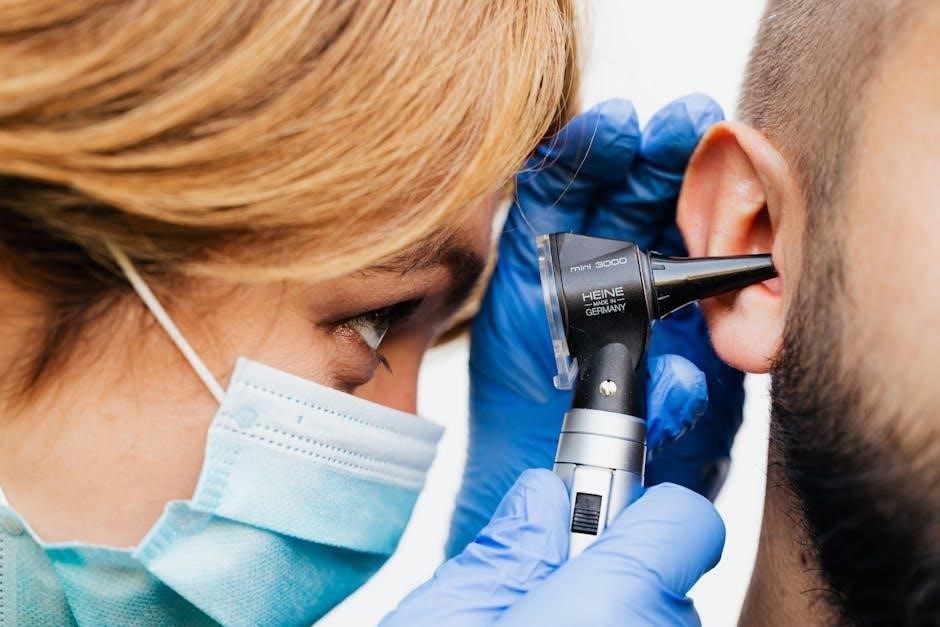The Dawn Apgar Clinical Exam Guide is a trusted resource for ASWB exam preparation, offering comprehensive study tools, practice tests, and expert insights to help social workers succeed.
1;1 Overview of the Guide
The Dawn Apgar Clinical Exam Guide is a comprehensive resource designed to help social work professionals prepare for the Association of Social Work Boards (ASWB) licensing exams. The guide is structured to cover key content areas, including human development, assessment, diagnosis, treatment planning, cultural competence, and professional ethics. It provides in-depth explanations of clinical concepts, practical study strategies, and practice questions that simulate real exam scenarios. The guide is particularly valued for its focus on the clinical exam, offering detailed insights into complex topics such as psychopathology, intervention strategies, and ethical decision-making. By combining theoretical knowledge with practical application, the guide equips candidates with the tools needed to master the exam format and content. Additionally, it includes study tips and insights into common pitfalls, making it an essential resource for social workers aiming to succeed in their licensing journey.
1.2 Importance of the Guide for Social Work Licensing Exams
The Dawn Apgar Clinical Exam Guide is a vital resource for social work professionals preparing for licensing exams, such as the LCSW, LMSW, and LSW. Its structured approach ensures candidates grasp both theoretical and practical aspects of clinical social work, aligning with the ASWB exam format. The guide is particularly valued for its ability to bridge complex clinical concepts with real-world applications, making it indispensable for understanding key areas like assessment, diagnosis, and intervention. By focusing on high-probability exam content, it helps candidates prioritize their studying and build confidence. Additionally, the guide’s emphasis on ethical decision-making and cultural competence addresses critical areas frequently tested on the exams. Its popularity stems from its ability to simplify challenging topics and provide a clear roadmap for success, making it a cornerstone of exam preparation for aspiring social work professionals.
1.3 Brief Biography of Dr. Dawn Apgar
Dr. Dawn Apgar is a renowned expert in social work education and licensure preparation. With extensive experience in clinical practice and education, she has dedicated her career to helping social workers achieve their licensing goals. Dr. Apgar’s work focuses on creating accessible, high-quality study materials that reflect the complexity and nuance of clinical social work. Her guides are widely recognized for their clarity and effectiveness in preparing candidates for the ASWB exams. A respected author and educator, Dr. Apgar continues to contribute to the field, ensuring that her resources remain aligned with current exam content and professional standards. Her commitment to student success has made her a trusted name among social work professionals seeking to advance their careers through licensure.

Understanding the ASWB Exams
The ASWB exams are standardized tests for social work licensure, assessing knowledge in clinical practice, assessment, diagnosis, and treatment planning. They are administered by the Association of Social Work Boards (ASWB), ensuring competence in the field.
2.1 Types of ASWB Exams (LCSW, LMSW, LSW)
The ASWB offers three primary licensure exams: Licensed Clinical Social Worker (LCSW), Licensed Master Social Worker (LMSW), and Licensed Social Worker (LSW). Each exam is tailored to assess competencies specific to the level of practice. The LCSW exam focuses on advanced clinical practice, including diagnosis, treatment planning, and interventions. The LMSW exam evaluates skills in non-clinical or master’s-level practice, such as case management and assessment. The LSW exam, often an entry-level credential, tests foundational knowledge in social work principles, ethics, and basic practice skills. These exams ensure candidates demonstrate the necessary knowledge and skills for safe and effective social work practice at their respective levels. Dr. Apgar’s guide provides targeted preparation materials for each exam type, helping candidates navigate the specific content and formats of the LCSW, LMSW, and LSW exams.
2.2 Exam Format and Content
The ASWB exams are multiple-choice, computer-based tests designed to assess a candidate’s knowledge, skills, and abilities in social work practice. The exams typically consist of 170-180 questions, with a four-hour time limit. The content is divided into several categories, including human development and behavior, assessment and diagnosis, treatment planning, and professional ethics. The questions are designed to evaluate both foundational knowledge and the application of that knowledge in clinical scenarios. The exams also include questions on cultural competence, diversity, and the ethical principles guiding social work practice. Each question is carefully crafted to reflect real-world situations, ensuring that candidates demonstrate practical competence.
Dr. Dawn Apgar’s guide provides detailed insights into the exam format, helping candidates understand the content breakdown and question types. This knowledge enables focused study and better preparation for the exam.
2.3 Passing Scores and Requirements
The passing score for ASWB exams is determined by the Association of Social Work Boards (ASWB) and is based on a scaled scoring system. Candidates must achieve a minimum score of 75% to pass, although the exact passing score may vary slightly depending on the exam version. The exams are scored based on the number of correct answers, with no deduction for incorrect or unanswered questions. The LCSW, LMSW, and LSW exams each have specific requirements, but all share the same scoring methodology. Dr. Dawn Apgar’s guide provides insights into understanding the scoring system and how to meet the requirements effectively. By focusing on high-weight content areas and improving test-taking strategies, candidates can better position themselves to achieve the necessary score. Proper preparation and practice are essential to meeting the exam’s rigorous standards.

Study Strategies for Success
Effective study strategies include active learning, consistent practice, and organized review plans. Dr. Apgar’s guide emphasizes structured study habits to master clinical content and exam formats effectively.
3.1 Effective Study Techniques for the Clinical Exam
Effective study techniques for the clinical exam include active learning strategies such as self-quizzing, summarization, and elaboration. Dr. Apgar’s guide recommends focusing on understanding key concepts rather than memorization. Prioritize areas where you need improvement by analyzing practice test results. Break down study material into manageable chunks and use mnemonics or mind maps to enhance retention. Regular review sessions help reinforce learning and prevent burnout. Incorporate real-life case scenarios to apply theoretical knowledge, simulating exam conditions. Utilize flashcards for quick recall of important terms and concepts. Consistency is key—establish a routine study schedule to ensure steady progress. Engage with study groups or online forums to discuss challenging topics and gain diverse perspectives. These methods, as outlined in Dr. Apgar’s guide, are designed to maximize efficiency and confidence for the clinical exam.
3.2 Time Management and Study Plans
Effective time management is crucial for mastering the clinical exam material. Create a structured study schedule, allocating specific time blocks for each topic based on your strengths and weaknesses. Prioritize areas where you score lower in practice tests. Dedicate consistent daily study sessions, ensuring adequate breaks to maintain focus. Regularly review and adjust your study plan to stay on track. Balance theoretical study with practice test simulations to apply knowledge. Avoid cramming by spreading study sessions evenly over weeks or months. Track progress using checklists or apps to monitor completion of study goals. Stay flexible to accommodate unexpected interruptions but maintain consistency. Schedule practice tests at intervals to gauge readiness. Ensure rest and self-care are included in your plan to prevent burnout. A well-organized study plan, as emphasized in Dr. Apgar’s guide, enhances efficiency and reduces exam anxiety.
3.3 Common Pitfalls to Avoid
When preparing for the clinical exam, several common pitfalls can hinder progress. Many candidates underestimate the exam’s difficulty, leading to inadequate study time. Overreliance on memorization without understanding concepts is another mistake, as the exam tests application of knowledge. Ignoring practice tests can leave candidates unprepared for the format and timing. Additionally, neglecting to review incorrect answers limits learning opportunities. Procrastination and poor time management are frequent issues, causing last-minute cramming. Overconfidence based on practice test scores can also lead to complacency. Lastly, failing to balance study with self-care often results in burnout. Dr. Apgar emphasizes the importance of avoiding these traps by staying disciplined, seeking support, and maintaining a holistic approach to preparation. By identifying and addressing these pitfalls early, candidates can maximize their chances of success.

Clinical Content Areas
The guide covers key clinical domains, including human development, assessment, treatment planning, cultural competence, and professional ethics, ensuring a comprehensive understanding of essential clinical skills and knowledge areas.

4.1 Human Development and Behavior
The section on human development and behavior in the Dawn Apgar Clinical Exam Guide explores the lifespan development of individuals, focusing on theoretical frameworks and their practical applications in social work. It emphasizes understanding human behavior across different stages of life, including childhood, adolescence, adulthood, and aging. The guide highlights how developmental stages influence client needs and behaviors, providing a foundation for assessment and intervention. Key concepts include normal vs. abnormal development, cognitive and emotional growth, and the impact of environmental and cultural factors. The content aligns with ASWB exam questions, ensuring social workers can apply this knowledge in real-world scenarios. By mastering this area, professionals can better address client challenges and develop effective treatment plans tailored to individual needs. This section is essential for understanding the biological, psychological, and social aspects of human behavior.
4.2 Assessment and Diagnosis
The Dawn Apgar Clinical Exam Guide provides a detailed exploration of assessment and diagnosis in social work practice, focusing on the skills and knowledge required for accurate evaluations. The guide emphasizes the importance of understanding client behaviors, identifying risk factors, and recognizing associated clinical conditions. It includes strategies for gathering comprehensive data, interpreting symptoms, and applying diagnostic criteria from the DSM-5. The section also highlights the role of cultural competence in assessment, ensuring that social workers consider diverse client backgrounds and experiences. Practical case examples and practice questions help exam candidates apply theoretical concepts to real-world scenarios. By mastering this area, social workers can develop effective treatment plans and interventions tailored to individual client needs. The guide also stresses the ethical considerations of diagnosis, ensuring professionals approach assessments with sensitivity and precision. This section is critical for building a strong foundation in clinical assessment skills.
4.3 Treatment Planning and Intervention
The Dawn Apgar Clinical Exam Guide thoroughly addresses treatment planning and intervention, providing social workers with practical strategies to develop and implement effective care plans. The guide emphasizes the importance of tailoring interventions to meet the unique needs of clients, ensuring cultural sensitivity and ethical practice. It covers key components of treatment planning, such as setting measurable goals, selecting evidence-based interventions, and monitoring progress. The section also explores various therapeutic approaches, including cognitive-behavioral therapy, psychodynamic therapy, and trauma-informed care. Practical examples and case studies illustrate how to apply these concepts in real-world scenarios. Additionally, the guide highlights the importance of client collaboration and empowerment in the treatment process. By mastering this area, social workers can design interventions that promote positive outcomes and address complex client challenges effectively. This section is essential for building competence in clinical practice and preparing for licensing exams.
4.4 Cultural Competence and Diversity
The Dawn Apgar Clinical Exam Guide places a strong emphasis on cultural competence and diversity, recognizing the critical role these play in effective social work practice. The guide provides in-depth discussions on understanding and respecting diverse client backgrounds, including race, ethnicity, gender, sexual orientation, and socioeconomic status. It offers practical strategies for identifying and addressing biases, ensuring that social workers can provide inclusive and equitable care. The section also explores the impact of systemic oppression and cultural norms on client experiences, highlighting the importance of culturally sensitive assessments and interventions. By integrating real-world examples and case studies, the guide helps social workers develop the skills needed to navigate diverse client situations with empathy and professionalism. This focus on cultural competence is essential for meeting the ethical standards of the profession and delivering effective, client-centered care. The guide’s approach ensures that social workers are well-prepared to address the unique needs of a diverse clientele.
4.5 Professional Ethics and Boundaries
The Dawn Apgar Clinical Exam Guide thoroughly addresses professional ethics and boundaries, a cornerstone of social work practice. It delves into the ethical principles outlined by the NASW Code of Ethics, emphasizing confidentiality, informed consent, and the avoidance of dual relationships. The guide provides clear examples and case scenarios to illustrate common ethical dilemmas, helping candidates understand how to apply ethical standards in real-world situations. It also explores the importance of maintaining professional boundaries to ensure client trust and integrity in the therapeutic relationship. By focusing on ethical decision-making models, the guide equips social workers with the tools to navigate complex situations confidently. This section is vital for preparing candidates to meet the ethical requirements of the ASWB exams and uphold the profession’s values in their future practice. The guide’s comprehensive approach ensures a deep understanding of ethical responsibilities.

Practice Tests and Simulations
Practice tests and simulations in the Dawn Apgar guide mimic real exams, helping candidates adapt to the format and timing, thereby improving confidence and readiness for the actual test experience.
5.1 Benefits of Practice Tests
Practice tests in the Dawn Apgar Clinical Exam Guide offer numerous benefits, including identifying knowledge gaps, improving time management, and reducing exam anxiety. They simulate real exam conditions, helping candidates familiarize themselves with the format and question types. By completing practice tests, social workers can assess their readiness, focus on weak areas, and build confidence. The tests also enhance critical thinking and problem-solving skills, essential for success on the ASWB exams. Regular use of practice tests allows candidates to track progress and refine their study strategies. Additionally, the feedback provided helps in understanding strengths and areas needing improvement. Overall, practice tests are a vital tool for mastering the clinical exam content and ensuring a well-prepared approach on exam day.
5;2 How to Use Practice Tests Effectively
To maximize the benefits of practice tests, candidates should simulate exam conditions by adhering to time limits and mimicking the actual test environment. Reviewing answers thoroughly after each test is crucial, focusing on understanding why correct answers are right and why incorrect ones are wrong. Identifying patterns of errors helps target weak areas for further study. Prioritizing topics where improvement is needed ensures efficient use of study time. Additionally, incorporating practice tests into a structured study schedule, such as taking one weekly, helps build consistency and confidence. Leveraging the explanations provided in Dr. Apgar’s guide can deepen understanding of complex concepts. Regularly analyzing test results to track progress is also essential for refining strategies and addressing gaps in knowledge. By using practice tests strategically, candidates can optimize their preparation and approach the actual exam with greater confidence and readiness.
5.3 Analyzing Test Results for Improvement
Analyzing test results is a critical step in improving exam performance. After taking a practice test, review each question thoroughly, focusing on areas where errors occurred; Identify patterns in incorrect answers to pinpoint weak knowledge areas. Prioritize these topics for further study using Dr. Apgar’s guide. Understanding the rationale behind correct answers enhances comprehension. Track progress over multiple tests to gauge improvement. Adjust study plans based on analysis to address gaps effectively. Regular review ensures retention and reinforces learning. By systematically analyzing test results, candidates can refine their knowledge, build confidence, and approach the exam with a well-prepared strategy. This methodical approach is key to achieving success on the ASWB Clinical Exam.

Additional Resources and Support
This section explores supplementary study materials, online communities, and the importance of peer support to enhance exam preparation and provide a supportive learning environment for candidates.

6.1 Supplementary Study Materials
Supplementary study materials for the Dawn Apgar Clinical Exam Guide include comprehensive outlines, practice tests, and flashcards. These resources are designed to reinforce key concepts and topics covered in the guide. Additionally, online study communities and forums provide spaces for candidates to discuss challenging areas and share insights. Dr. Apgar’s study tools, such as her LCSW exam prep book, offer structured study plans and practice questions that mirror the actual exam format. These materials are particularly helpful for identifying weak areas and focusing study efforts effectively. Many candidates also benefit from video tutorials and webinars that complement the guide. Overall, these supplementary materials enhance understanding and confidence, ensuring a well-rounded preparation for the ASWB exams.
6.2 Online Communities and Forums
Online communities and forums dedicated to the Dawn Apgar Clinical Exam Guide provide invaluable support for exam preparation. These platforms allow candidates to connect with peers, share study strategies, and discuss challenging topics. Many forums feature discussion threads where users can ask questions and receive advice from those who have successfully passed the ASWB exams. For instance, the ASWB Exam Prep Group on Facebook and Dr. Dawn Apgar’s Study Group are popular spaces for collaborative learning. These communities often include resources like study tips, practice question reviews, and exam-day advice. Additionally, some forums host live Q&A sessions with experts or recent test-takers, offering real-time guidance. Engaging with these online communities helps candidates stay motivated, gain new insights, and build confidence as they prepare for their exams. They also serve as a valuable supplement to traditional study materials, fostering a sense of camaraderie among learners.
6.3 Importance of Peer Support
Peer support plays a crucial role in preparing for the ASWB exams using the Dawn Apgar Clinical Exam Guide. Study groups and collaborative learning environments provide a space for candidates to discuss complex topics, share insights, and reinforce their understanding of clinical concepts. By engaging with peers, individuals can gain diverse perspectives, clarify doubts, and stay motivated throughout their study journey. Many candidates find that discussing challenging questions or case studies with others helps deepen their comprehension and application of the material. Additionally, peer support fosters accountability and reduces feelings of isolation, which are common during intensive exam preparation. Dr. Apgar’s study materials often emphasize the value of group learning, encouraging candidates to leverage their collective knowledge and experiences. This collaborative approach not only enhances individual performance but also builds a stronger, more connected professional network within the social work community. Such support systems are essential for achieving success and confidence on exam day.

Exam Day Preparation
Ensure you arrive early, bring required documents, and manage anxiety with relaxation techniques. Review key concepts briefly, stay focused, and approach each question systematically for optimal performance.
7.1 Logistics and What to Expect
On exam day, arrive early at the designated test center with proper identification and required documents. Familiarize yourself with the exam format, which typically includes multiple-choice questions. Avoid bringing prohibited items like phones or notes. Plan to arrive 30 minutes before the scheduled time to complete check-in procedures. The exam environment will be quiet and monitored to ensure fairness. Stay hydrated and focused by bringing allowed snacks or water. Use the provided materials, such as scratch paper, for note-taking. Be prepared to present your ID and any other requested documents. The test center staff will guide you through the process, ensuring a smooth experience. Use resources like Dr. Apgar’s guide to understand the logistics and what to expect, helping you stay calm and prepared. Proper planning ensures you can focus on demonstrating your knowledge confidently during the exam.

7.2 Managing Exam Day Anxiety
Exam day anxiety is common, but manageable with the right strategies. Dr. Apgar’s guide emphasizes the importance of relaxation techniques, such as deep breathing exercises or positive affirmations, to calm your mind. Avoid last-minute cramming, as it can heighten stress. Instead, arrive early at the test center to acclimate to the environment. Visualize success and remind yourself of your thorough preparation. Stay hydrated and energized with light snacks to maintain focus. Refrain from discussing exam content with others, as it may increase anxiety. Trust in your study efforts and approach the exam with confidence. By staying composed and focused, you can perform at your best and demonstrate your knowledge effectively. Dr. Apgar’s guide offers additional tips to help you manage nerves and stay centered during the exam.
7.3 Last-Minute Review Tips
Last-minute review should focus on reinforcing key concepts rather than cramming new information. Skim through high-weight topics identified in Dr. Apgar’s guide, such as clinical assessment, diagnosis, and intervention strategies. Use flashcards to quickly review important terms and concepts. Practice recalling treatment plans and ethical dilemmas without overcomplicating the content. Reviewing practice test questions can help reinforce your understanding of the exam format and content. Avoid distractions and ensure a quiet, organized study space. Stay calm and remind yourself of your preparation. Dr. Apgar’s guide emphasizes the importance of a focused, targeted review to build confidence and clarity. By staying organized and methodical, you can maximize your final preparation and approach the exam with a clear mind. This strategic approach ensures you’re ready to tackle the exam effectively.
